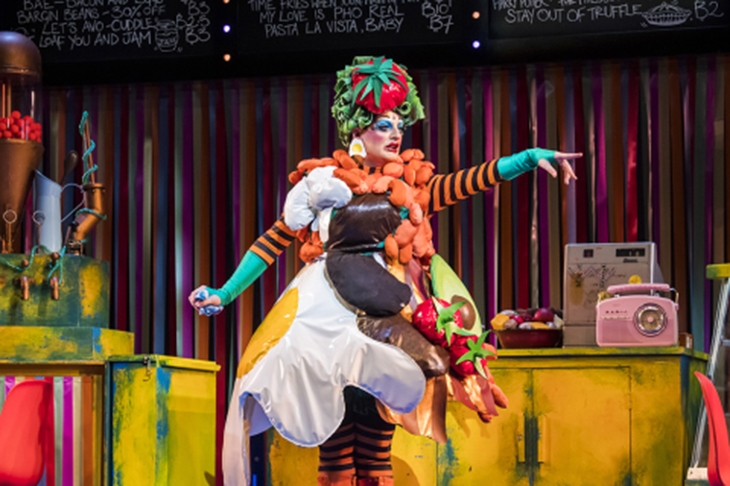Lauren Gunderson’s play I and You opens in the scruffy bedroom of 17-year-old Caroline. Lonely, beautiful and furious, she’s unable to participate in school life owing to a chronic liver problem. Into her hideaway barges Anthony, a handsome geek, who wants her to help with a Walt Whitman project. Caroline tries to chase him off but resourceful Anthony charms her into accepting his presence. What follows is a hilarious and beautifully observed study of modern teenage romance. Parents will recognise details like this: Caroline offers her guest a Coke but instead of asking him to fetch it from the kitchen she sends the request to Mom by text. Five minutes pass. ‘Where’s that Coke?’ huffs Caroline. ‘I ordered it, like, a month ago.’ Anthony lists his squeaky-clean hobbies: poetry, jazz and basketball. ‘You’re such a senator,’ jeers Caroline, but the insult is also a come-hither which the characters can’t read but the audience can. Not many boys want to become a senator but a lot of girls would like to marry one.
The delicate ingenuity of this moment is typical of Gunderson’s breathtaking artistic facility. The bickering lovers seal their relationship with a chaste kiss but their romance is disrupted by a colossal and entirely unforeseen reversal of circumstances. This surprise ending doesn’t belong in the class of ‘clever plot twists’ but in the rarer field of ‘great life-affirming moments in the theatre’. Seriously. A new playhouse could be built to stage nothing but productions of this 90-minute masterpiece. Some critics found the ending ‘unearned’ or ‘overcontrived’, but it went through my heart like a dagger. Outside, I passed a sympathetic reviewer. ‘That’s one of the best plays I’ve ever seen!’ I chirped. ‘Grrr,’ he replied.
Angry writer debbie tucker green styles herself in lower-case letters. This is annoying for reviewers because any sentence that commences with her name looks like a printing error. Pre-annoyed, therefore, I went to see her new work, ear for eye, and it immediately raised my annoyance levels to 11. This isn’t a play but a scruffy heap of sketches and monologues with no storyline, no linked characters and no fixed location. Two black people complain of being cuffed, beaten and strip-searched by the police. They fail to report these offences and seem unaware that a complaints system even exists. A pair of men, possibly in prison, exchange impenetrable gripes. A granny in ethnic headgear mopes about ‘hateful, hate-filled eyes’ and ‘children who had no chance’.
The show’s longest chunk is set in America where an articulate, sophisticated and enormously patient black criminologist discusses the causes of a school massacre with a moronic white professor who believes that anyone who challenges him is mentally ill. Because the circumstances of the massacre are obscure, it’s impossible to know whether the characters’ conclusions are accurate or worthless. After two boring hours we get a video-y bit. The Jim Crow laws are parroted by white southerners wearing modern clothes, as if to suggest that America still practises apartheid. Next, pale English faces recite the provisions of something called the ‘British Slave Code’, a term that overlooks history and makes no reference to the extinct empire under which the rules were framed. The implication is that modern Brits are a lynch mob intent on exterminating black people.
This thesis has an obvious flaw. If white supremacists are in charge why did they hire a black activist to expose their murderous prejudices at a London theatre? Unless, of course, a longer game is in play, and the racists have cunningly diverted the world’s attention to the Royal Court while the killings continue unnoticed. In which case, debbie tucker green is doing the white man’s work. Oh dear. She’s an Uncle Tom. But there’s a larger issue here: the issue of trust. The Royal Court and its sponsor, Arts Council England, should stop hoodwinking black theatre-makers into believing that a market exists for this sort of bilious pageant full of gobby nincompoops spilling humourless anger at yawning audiences who long to escape. Imagine the scandal if the Department for Transport were to encourage black-led bus companies to ply routes with no passengers using clapped-out coaches. Or if the health service paid black pharmacologists to develop and sell toxic drugs. This is what we have here.
The Royal Court has abused the talent of 15 trained actors by dumping them in a jumble of angry witter dashed off by a sad bore who seeks to characterise black British culture as a heroic fightback against an evil master race. Unsurprisingly, she can’t find room to mention black millionaires, judges, bishops, privy councillors, scientists, engineers, TV presenters or senior cops because they wouldn’t fit in with her antiquated sentimentalism. Her view of black culture is so narrow that I half-expected the show to end with tap-dancing.







Comments